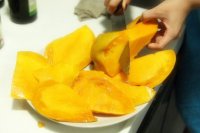What Do Mangoes and Learning Have in Common?
Your content has been saved!
Go to My Saved Content.Have you ever tried to eat a mango? Well, it is quite an experience. Though mangos are my favorite fruit, I do not indulge as much as I would like because of the hassle of pealing and then eating it. To date, I have not personally found a clean way to eat a mango. It's kind of like trying to peel a peach and then eat it, or maybe even more like buttery corn on the cob -- both a juicy mess.
As you eat the mango, you cannot help but become irrevocably invested in the mango eating process because it gets all over your face and it drips all over your hands and clothes. But each bite is heavenly, and certainly worth it.
The Best Part
Yes you guessed it; teaching is kind of like eating a mango. Definitely a worthwhile endeavor, but a good teacher will be invested in the sweet stickiness of the classroom, and the gooey uncertainty of student learning gets all over the place, much of it on the teacher and a good amount on the students. Preparing the mango for consumption begins the sticky process, similar to preparation of the learning experiences for the students. Pealing back the protective skin reveals the sweet orange colored enticement. Teachers also peal back the jargon of the state standards seeking for the most important learning expectations for the students to devour. Once the mango is pealed, there is no escaping the necessity of holding the juicy mango with your fingers in order to eat it. Then the actual fun of consuming of the mango begins.
Having fun with students learning is rarely an antiseptically clean event. Teachers are rarely behind their desks, students are excitedly discussing learning and rarely in their desks. Critical reading is only a little messier than critical writing, while math and science manipulatives usually scatter on the desks and floors. Document-based questions (DBQ's) lead students in history class to scour the books, magazines, online resources, perhaps via iPad, to answer them -- not forgetting the messy efforts to cite sources and make note cards. A well-consumed mango leaves the individual with sticky juices down to the elbows, cheeks, chin and nose in the same condition.
Aside from the mildly annoying fibers between the teeth, the mango aficionado licks lips and fingers as best he can and savors with a smile the lingering flavors of the heavenly fruit. After productive and messy learning, all over the world, smiling teachers thoughts linger on the fun and the joy experienced as they happily clean up the residue of learning that occurred in their classrooms.
For the Fun of It
Dr. Michael Schmoker wrote a fascinating book, called Focus in which he claims that the simple, straightforward learning processes are the best, if used consistently. What could be more simple and straightforward than having fun while learning? There is nothing magical or mystical about inspiring learning. Just have fun doing it. It doesn't take special training, or tools, or technology. The teacher simply must be an enthusiastic aficionado of learning and not afraid of a little disorder, chaos or messiness in order to engage students of all ages.
There is a solution, by the way, to the messiness of mangoes. In the Zocalo (City Square) of Mexico City, you can buy a huge mango (sprinkled with cayenne pepper), pre-pealed, and prepared on a stick to minimize the mess, but somehow that takes away some of the fun of eating mangoes, and the personal nature of the process.
Never let the standardized testing movement steal the joy and the mess of learning with your students. Take a minute to share with us your fruity experiences of teaching.
Photo credit: fred_d_lee via flickr (CC BY-NC-ND 2.0)
